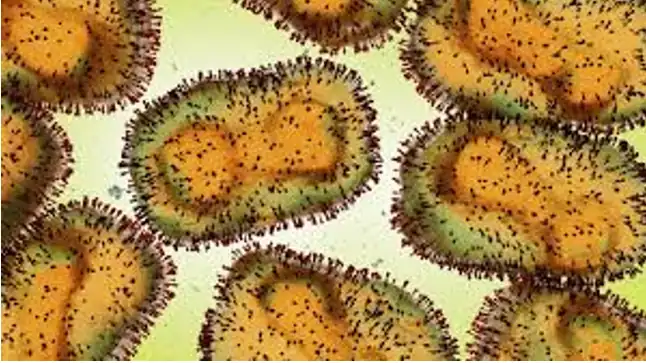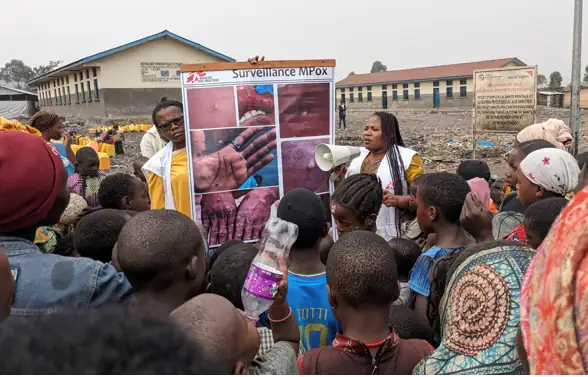
Shanoya Douglas from Jamaica wins one Gold, one Bronze at U20 World Championship
2024-09-02 09:33:40
The disease rooted in traditional regions of Central and West Africa is now a global issue.

The Monkey Pox, which is also known as Mpox recently garnered global attention following its major outbreak. The disease rooted in traditional regions of Central and West Africa is now a global issue.
This disease caused by the pox virus, presents similar symptoms to those of smallpox but is generally less severe than that of smallpox. But, is it emerging as a new Pandemic?
WHAT IS MONKEY POX?
Monkeypox is referred to as viral zoonosis (a disease that is transferred from animals to humans). The virus is part of the orthopoxvirus genus and is a member of the Poxviridae family. Mpox being a double-stranded DNA virus, has a relatively stable Genetic structure, making it mutate at a slower rate compared to RNA viruses.

This Stability among the virus helps produce more effective vaccines and consistent diagnostic testing as the genetic code remains predictable for a longer period of time. The genus orthopoxvirus also contains other poxvirus including Variola Virus (Smallpox), Vaccina Virus (used for smallpox virus), and cowpox virus.
Mpox is classified into two categories according to its origin
HOW IS MONKEY POX TRANSMITTED?
Animal-to-human transmission
The Monkey Pox virus being zoonotic originates in animals and transfers to humans. The virus is believed to be spread from certain rodents, or non-human primates, however the exact source remains unknown. The virus could be transmitted in humans through various factors.
Human-to-Human Transmission
The disease is mostly transmitted through animals, however human to human transmission is still possible, especially during a major outbreak.
SYMPTOMS OF MONKEY POX
The rashes emerge out as the first symptom in most of the cases and often develop into a liquid-filled blister which is itchy and painful. Upon healing the rash dries and falls off. Many people can develop a few to hundreds of such lesions anywhere on their body.

Lesions can develop in areas including the palms of hand, face, mouth, throat, groin, genital areas, anus, and soles of feet. The disease also depicts many other symptoms including;
PREVENTION FOR MONKEY POX
As the disease is spreading at such a proliferating rate, it becomes crucial to manage it as early as possible. In order to overcome the disease, there are certain precautions to be taken.
WHO ARE MOST SUSCEPTIBLE?
Mpox can affect anyone of any age, however, some people are at a greater risk than others. These include people in close contact with the infected individuals, such as family or caregivers.
Additionally, persons who reside in Central and West Africa are the most susceptible as the virus has a widespread and deadly outbreak in those regions, particularly in forests and tribal regions.
WHY AFRICA IS INVOLVED FOR THIS GLOBAL OUTAGE?
Africa emerges to be the area of concern as the virus is endemic to parts of Central and West Africa. The virus there has long been present in animals and transfers from them to humans.

Africa came into talks when a new strain of the virus was discovered there in 2023. This new strain is said to have a higher mortality rate and is more transmissible among humans. The limited healthcare facilities available in the country caused a rapid spread of the disease.
Additionally, the disease also had a major outbreak in 2022 which led to over 99000 cases across 116 countries. Although this outbreak was controlled with vaccination and lifestyle changes, this time a new and more fatal strain is causing more mortalities and a widespread effect.
IS IT A NEW PANDEMIC?
Despite its rising cases around the globe, the disease is not classified as a pandemic by the WHO. However, they state it as a public health emergency of international concern.
Unlike pandemics, which occur with a widespread transmission from one human to others, Monkey Pox is only linked to transmission from one infected person to another or through contaminated objects and animals.
The global outbreak, however, is significant but it does not contribute to a global pandemic as the cases are much constrained as compared to them. The WHO still warns all the health authorities globally to look for the cases and immediately treat them for a controlled treatment.